HarmonyOS4.0系列——03、声明式UI、链式编程、事件方法、以及自定义组件简单案例
HarmonyOS4.0系列——03、声明式UI、链式编程、事件方法、以及自定义组件简单案例
声明式 UI
ArkTS以声明方式组合和扩展组件来描述应用程序的UI,同时还提供了基本的属性、事件和子组件配置方法,帮助开发者实现应用交互逻辑。
如果组件的接口定义没有包含必选构造参数,则组件后面的“()”不需要配置任何内容。例如,Divider组件不包含构造参数(下划线组件)
$r`形式引入应用资源,可应用于多语言场景
struct 内部无需用 let 声明,外部需要用 let 声明
使用 Stage 模型的应用,需要在module.json5配置文件中声明权限。
例如加载网络图片,语法:
Image(src: string | Resource | media.PixelMap)
加载本地资源
Image("images/view.jpg").width(200);
加载网络图片需要申请权限
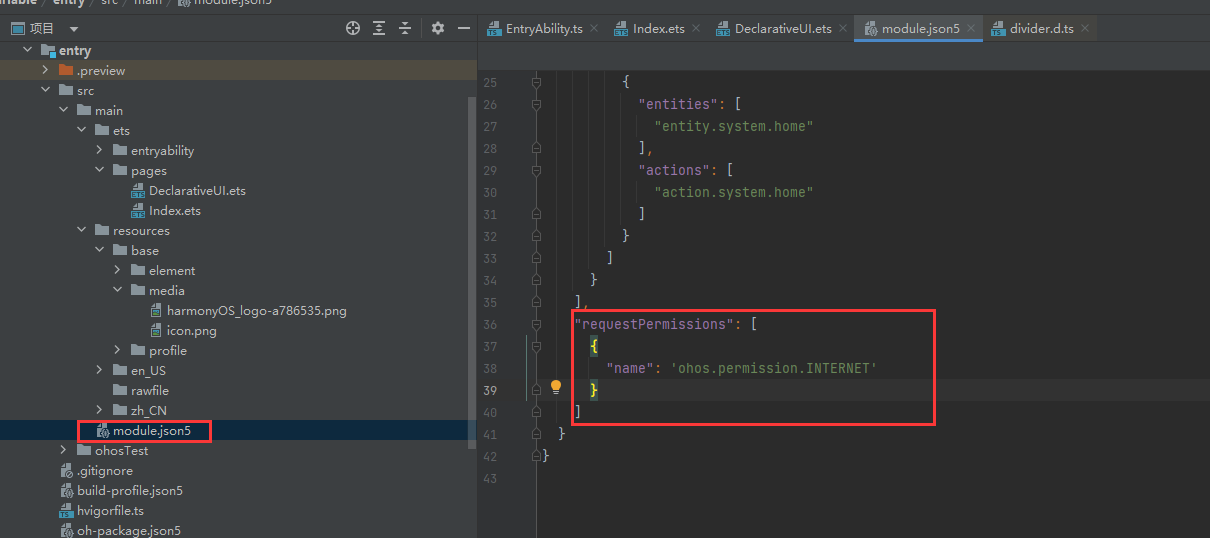
Image(
"https://profile-avatar.csdnimg.cn/63cdb1329d9e45b49ccbc25c10e23baf_nanchen_j.jpg!1"
); // 实际使用时请替换为真实地址
@Entry
@Component
struct DeclarativeUi {
@State message: string = 'Hello World'
build() {
Row() {
Column() {
Text('声明式UI')
Divider()
Image('https://profile-avatar.csdnimg.cn/63cdb1329d9e45b49ccbc25c10e23baf_nanchen_j.jpg!1')
.width(100)
.height(100)
}
.width('100%')
}
.height('100%')
}
}
实际效果:
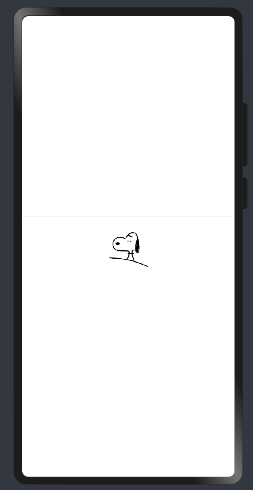
Resource 资源
使用资源格式可以跨包/跨模块引入图片,resources 文件夹下的图片都可以通过$r 资源接口读取到并转换到 Resource 格式。
Image($r("app.media.icon"));
也可以将图片放在rawfile文件夹下
其中:$r代表的是资源类型,app.media为应用程序下的媒体资源
链式编程
一条一条编写,类似于JQuery
Text("声明式UI").fontSize(40).fontColor(Color.Green);
事件方法
动态监听值的变化,例:
@Entry
@Component
struct DeclarativeUi {
@State num:number = 3
build() {
Row() {
Column() {
Text('声明式UI'+this.num)
.fontSize(40)
.fontColor(Color.Green)
Divider()
Button('click++').onClick(()=>{
this.num++
})
}
.width('100%')
}
.height('100%')
}
}
@Entry
@Component
struct DeclarativeUi {
num:number = 3 // 不会具有响应式
}
注意:在struct中声明变量动态绑定需要用到@Struct,否则不会是响应式
private
定义私有变量,写法:
private content:string = 'Southern Wind'
自定义组件
当我们需要写多个文本不同但样式相同的效果,需要使用自定义组件来实现,下面是需要注意的几点
- @Component:
@Component装饰器仅能装饰struct关键字声明的数据结构。struct被@Component装饰后具备组件化的能力,需要实现build方法描述UI,一个struct只能被一个@Component装饰。 @Entry放在哪个组件前面,哪个就在页面上显示- 在
Entry组件中,build()中必须有且只有一个更组件 - 自定义组件必须定义
build()函数
定义一个itemComponent的组件
@Component
struct itemComponent{
// private私有变量
private content:string = 'Southern Wind'
build(){
// @ts-ignore
Row(){
Image($r('app.media.gray'))
.width(30)
.height(30)
.margin(15)
Text(this.content)
.fontSize(30)
.fontColor(Color.White)
}
.backgroundColor(Color.Gray)
.borderRadius(20)
.padding({
right:20
})
.margin({
top:15
})
}
}
在主组件中渲染
@Entry
@Component
struct Index {
build() {
Row() {
Column() {
Divider()
itemComponent()
itemComponent({
content:'我是第二个文本'
})
itemComponent()
itemComponent()
}
.width('100%')
}
.height('100%')
}
}
效果:
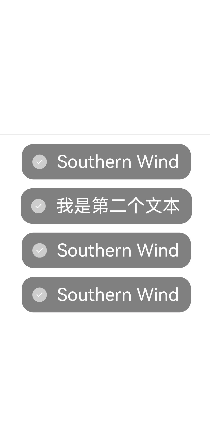
这里可以看到,自定义组件定义的变量在渲染第二次的时候可以被赋值替换
自定义组件具有以下特点
可组合:允许开发者使用系统组件、及其属性和方法
可复用:自定义组件可以被其他组件复用,并作为不同的实例在不同的父组件或容器中使用。
数据驱动UI更新:通过状态变量的改变,来驱动UI的刷新。
@Component
struct itemComponent{
// private私有变量
private content:string = 'Southern Wind'
@State isStatus:boolean = false
build(){
// @ts-ignore
Row(){
Image(this.isStatus ?$r('app.media.gray'):$r('app.media.gou'))
.width(30)
.height(30)
.margin(15)
Text(this.content)
.fontSize(30)
.fontColor(Color.White)
}
.backgroundColor(Color.Gray)
.borderRadius(20)
.padding({
right:20
})
.margin({
top:15
})
.onClick(()=>{
this.isStatus = !this.isStatus
})
}
}
图片交互时渲染可以采用三元表达式的写法进行书写
效果:
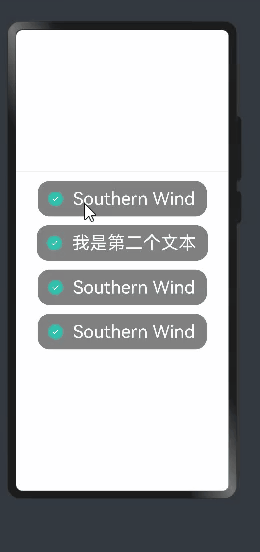
添加下滑线:TextDecorationType文本枚举类型
.decoration({
type:TextDecorationType.None
})

完整代码及效果:
@Entry
@Component
struct Index {
build() {
Row() {
Column() {
Divider()
itemComponent()
itemComponent({
content:'我是第二个文本'
})
itemComponent()
itemComponent()
}
.width('100%')
}
.height('100%')
}
}
@Component
struct itemComponent{
// private私有变量
private content:string = 'Southern Wind'
@State isStatus:boolean = true
build(){
// @ts-ignore
Row(){
Image(this.isStatus ?$r('app.media.gray'):$r('app.media.gou'))
.width(30)
.height(30)
.margin(15)
Text(this.content)
.fontSize(30)
.fontColor(Color.White)
.decoration({
type:this.isStatus ?TextDecorationType.LineThrough :TextDecorationType.None,
color:Color.Black
})
}
.backgroundColor(Color.Gray)
.borderRadius(20)
.padding({
right:20
})
.margin({
top:15
})
.onClick(()=>{
this.isStatus = !this.isStatus
})
}
}
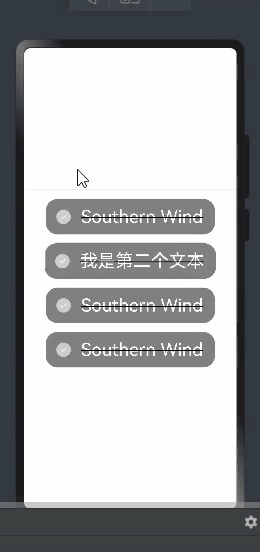
图标:

